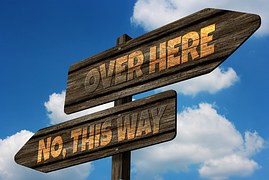“There will be very few occasions when you are absolutely certain about anything. You will consistently be called upon to make decisions with limited information. That being the case, your goal should not be to eliminate uncertainty. Instead, you must develop the art of being clear in the face of uncertainty.”
Andy Stanley
Image from pixabay
In today’s world, we’re bombarded with choices and flooded with input. It’s no wonder that many of us have become more hesitant and indecisive in life!
Should I invest in the stock market or real estate or that new business venture my buddy thinks will be a winner?
Should my kids go to private or public school and which of the gazillion extra-curricular activities should they be involved in?
Which of the 5,000 channels I’m getting on my TV should I watch tonight?
Though it’s understandable, being indecisive is rarely a positive position and is often destructive or even deadly. Here are some keys to becoming a master decision maker:
Know Your Foundation
When you’re clear on your values and priorities, making decisions comes pretty easily. When those values and priorities are fuzzy, as the old saying goes “any wind behind your sails will do.” So rather than trying to make specific decisions, first step back and focus on your values.
One way I teach this in my Neuro Linguistic Programming trainings is to jot down everything you value within each area of life. For example, in relationships, you might value qualities like intimacy, honesty, fun, or shared goals and dreams. When you have generated a good list of values, ask yourself: “If I could only have one of these qualities within a relationship, which would that be?” Identify that value and circle it, then ask: “If I could have one other quality, which would that be?” Keep asking yourself until you’ve circled five major values.
Once your values are clear in each area, approach your decision again. Your best choice will be a lot more obvious!
Tap Your Na’au
In ancient times in Hawai`i, people who trusted their na’au (their gut, core or center) were considered to be the more intelligent than those who relied on the analytical conscious mind. To trust the na’au means you are able to hear messages from your unconscious intuition.
Today, we live in a world that emphasizes our conscious minds and analytical thinking. We tend to be less respectful of intuition or gut intelligence. It’s fine to think things through, analyze the data, and weigh all factors. But when you’ve done that and still end up feeling confused, check out your gut.
How? The intuition or unconscious communicates in feelings and images so that’s what you want to tune into. One way is to play out the scenario. Ask yourself, “If I follow option A, what might it look like in a few days or years?” Allow your imagination to run with it. What pictures show up? How do you feel about the way it seems to be panning out?
Another trick is to flip a coin. Establish which choice is heads and which is tails. Then pay attention to the split second between tossing the coin and seeing the result. In that brief moment, did you notice that you wanted one choice or the other to win? That’s your na’au talking.
What if I’m wrong?
Floating in the background of most indecisiveness is that vague, fuzzy fear of “What if I screw up and choose incorrectly?” We somehow think that not choosing at all—which really is a choice itself!—will be safer than doing the “wrong” thing.
Successful people know that they’ll make mistakes. They understand that failure is not the opposite of success, it’s an important part of success. Often we learn to make good choices by making a bunch of really crummy ones!
Here’s where the question “What’s the worst that can happen?” is valuable. It pulls that hazy fear out into the open so you can deal with it. And when you really think it through, “the worst that can happen” with a poor decision is usually not all that bad– and rarely life threatening.
Sweat the Small Stuff
By this, I don’t really mean that you should worry over every tiny choice you make! Studies claim that Americans make 70 different choices a day on average. Most of them are insignificant and we make them on the fly. Does it really matter whether you choose chocolate or vanilla? No. But why not use some of these small choices as practice?
Next time you have a chocolate versus vanilla type-decision, take a moment with it. Ask yourself: Which fits more clearly within your values, your goals? Check your intuition: Which feels like the better choice? Finally, ask “What’s the worst that can happen if I make the wrong choice here?”
Be Done and Follow Through
A student mentioned that her golf instructor used to say, “Once you’ve selected a club for a particular shot, there’s no second-guessing. Trust it. Assume that you have the perfect club in hand and give it all you’ve got. If you’re hesitant with it, you’ll never find out whether it was the right club or not.”
Once you’ve run through the process and made a decision, be done with deciding! Assume you’ve made the right choice until proven otherwise. Give that choice a chance to prove itself. Follow through as fully as you can. Know that even if this choice doesn’t pan out, you’ll learn something valuable by committing to it.
Life is full of choices, challenges and obstacles. As psychologist George Weinberg points out:
“The cure for most obstacles is, be decisive.”
Mahalo,
Dr. Matt
——————————————————————————————————————————




